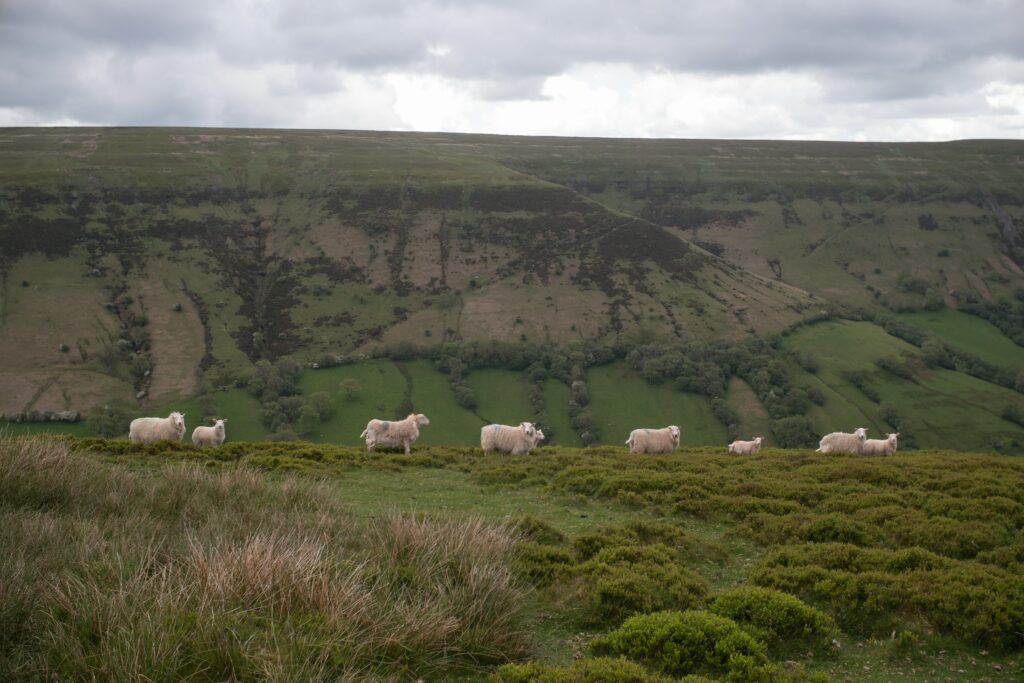Ruth Lawrence highlights how Welsh agricultural policy can help to support a sustainable, agroecological future for Welsh farming.
WWF Cymru launches their Land of Our Future report at this year’s Royal Welsh Show, in partnership with the Landworkers’ Alliance and Food Sense Wales. Agroecological farming in its many forms has great potential in Wales, to ensure farming is at the heart of our communities and produces high quality food, whilst helping to restore biodiversity, tackle climate change and reduce agricultural pollution from things like nutrient leaching and soil erosion.
Agroecology can be described as a farming practice, a science, and a movement. It is an approach that takes a holistic view of food systems, applying ecological concepts to farming systems to deliver healthy ecosystems as well as healthy food. As a movement, it creates social and political change; advocating for rebalanced and strengthened food systems that work for everyone along its supply chain, from producer to consumer.
Agroecology can be described as a farming practice, a science, and a movement.
A government mandate for change
In collaboration with Wales Environment Link and its members, WWF Cymru have worked to push for nature friendly farming practices to be supported in policy, and agroecology has now been included for the first time in Welsh law, as part of the Explanatory Memorandum of the Agriculture (Wales) Bill due to receive royal assent in August.
The UN’s Biodiversity Conference (COP15) last December highlighted that we have just seven years to reverse the loss of our natural world and commitments were made by leaders globally to act. The Welsh Government are committed to ensuring that Wales plays its part in meeting the targets set out in the new Kunming- Montreal Global Biodiversity Framework (KM GBF) and have reiterated their commitment to ensure that the Agriculture (Wales) Bill contributes towards reaching those targets. The KM GBF directly acknowledges agroecological farm practices as a tool that can be used for sustainable agricultural management and its inclusion in the Agriculture Bill’s Explanatory Memorandum now empowers the Welsh Government to design the Sustainable Farming Scheme in a manner that is compliant to the COP15 agreement and could put agroecology at its heart.
Innovative. Informed. Independent.
Your support can help us make Wales better.
Land of Our Future
The Land of Our Future report, published by WWF Cymru in partnership with the Landworkers’ Alliance and Food Sense Wales, showcases six agroecological case studies. These six diverse Welsh farms all practice elements of agroecology, using synergies within their farming systems to harness the benefits of nature, whilst reducing their inputs, improving soil health, increasing biodiversity, and securing long-term resilience for their farms.
The report underlines the importance of Welsh Government support for agroecological farmers to be included in the Sustainable Farming Scheme and highlights some of the benefits of agroecological farming:
Circular systems that work with nature
Agroecological systems work to create more circular farming systems that improve their sustainability. The case studies demonstrated less reliance on farm inputs such as fertiliser and feed. Recycling ‘waste’ from the farm rather than buying in expensive chemical fertilisers saves money and reduces the impact on the wider environment. If applied correctly, natural fertilisers like compost and animal waste can also reduce nutrient leaching, a large cause of pollution of our watercourses. Rotational grazing methods and feed grown on-farm also reduces the need for feed sourced from abroad that is often linked to issues such as deforestation and destruction of natural habitats. It also increases their farms’ resilience, by making them less vulnerable to volatile price increases.
Nature is thriving on these farms. Soil management practices such as low tillage and cover cropping reduces soil erosion, improves soil structure and rebuilds the biodiversity of soil organisms; many of which are beneficial for cycling nutrients and improving organic matter. Letting hedgerows mature provides habitat and food for wildlife and livestock alike; farm animals can forage to self-medicate and use them for shelter and shade in bad weather.
Rotational grazing encourages more grassland diversity and sowing spring oats for overwinter stubble increases bird numbers and provides valuable food and shelter for birds and insects, year-round. Deeper grass roots from reduced chemical fertilisers can also help to mitigate against the increasingly prevalent effects of climate change, improving water retention in drought and improving soil health and increased tree and shrub cover, contributing to improved carbon sequestration.
Social gains
Agroecology recognises that humans are entwined with the future of food systems and farms. Land of Our Future demonstrates the aspects of agroecology that work to benefit the communities in which these farms preside.
As well as providing food for local communities, some of the farms are also engaging in training and education programmes to help spread agroecological farming practices to new entrants and educate school children and the public about where their food comes from. One farm has introduced a ‘pay it forward’ scheme for their veg boxes, helping those on a low income to access healthy produce.
As a farming sector, agroecology is also attracting a new generation of farmers, helping to revitalise an ageing sector in Wales. The Welsh landrace wheat, ‘Hen Gymro’ is being grown on several of the farms, helping to revitalise old Welsh farming species that had previously disappeared from our farming heritage.
Robust debate and agenda-setting research.
Support Wales’ leading independent think tank.
Backing agroecology in policy
The benefits of agroecology for communities, nature, and farmers are clear, but there are several actions that need to be taken by Welsh Government to ensure the Sustainable Farming Scheme delivers for agroecological Welsh farmers:
Provide financial support sooner rather than later
Agroecological farms don’t want to rely on subsidies but providing so many public goods at one time comes at a cost in terms of farmer profits. Many agroecological farmers must sell their produce at a premium to make it pay, which can limit its market as well as its social impact and reach. There is a need for more financial support and being rewarded for environmental services would help, especially when farmers are transitioning to these more nature and climate friendly systems.
Training
Agroecology is knowledge intensive and currently training mainly comes from existing agroecological farmers. If the Agriculture (Wales) Bill and the Sustainable Farming Scheme is to achieve what it has set out to do, training to upskill our farmers for a transition to more agroecological practices is paramount. Those practicing agroecology are often the best placed to pass this knowledge on, but farmers need to be financially supported by Government, to foster this peer-to-peer sharing.
Heal the disconnect
Projects that work towards improving food accessibility, and education and training programmes that focus on healing the disconnect between people and where their food comes from should not be the sole responsibility of farmers. Financial support from government would help to support these projects and improve the social benefits they can provide.
Support farm to fork supply chains
Public sector food procurement presents an opportunity for Government to increase the amount of healthy, Welsh food on our plates and can give farmers an important route to market for their produce. Government should support the development of such mechanisms that would enable this, for instance through a Supply Chain Investment Scheme, as trialled in the Courgette Pilot, by paying for the difference in price between the cheapest food and local, agroecological alternatives.
Discussions and debates that drive Wales forward.
Join Wales’ leading independent think tank.
Get behind horticulture
The horticulture sector has historically been excluded from most government subsidy support, often due to the relatively small size of many horticulture farms. Yet, despite their size, these farms have great potential to produce a large volume of food. If horticultural land in Wales was increased from current levels of just 0.08% to 2.8% of agricultural land, we could meet the nutritional needs of the whole country (based on the Eatwell guide).
A specific horticulture public goods scheme within the Sustainable Farming Scheme would reward agroecological growers for the wider environmental and social benefits that they contribute to society. Trials like England’s Growing the Goods could be replicated in Wales and would help to explore how horticulture growers of all scales can benefit from farming subsidies, to ensure that horticulture as a sector isn’t left behind.
The Horticulture Development Scheme should be improved to increase its financial accessibility and application process. Apprenticeship schemes within horticulture should be set up to address the current skills gap in this sector, and to ensure training is relevant for Welsh horticulture businesses who want to employ agroecological methods on their farms. Training provision should continue to be delivered for horticulture, through Farming Connect, and increased across Wales.
Only a shift away from business as usual can ensure the long-term resilience of Welsh farming businesses in the face of the challenges of nature loss and climate change.
We need the Welsh Government to be bold and take confident strides within the Sustainable Farming Scheme to support a Welsh transition to agroecological farming. Only a shift away from business as usual can ensure the long-term resilience of Welsh farming businesses in the face of the challenges of nature loss and climate change. Agroecology provides a way for us to renew our connections to nature and the land, and to provide long term security for our farmers, our communities, and nature. You can find the Land of Our Future report, online.
All articles published on the welsh agenda are subject to IWA’s disclaimer. If you want to support our work tackling Wales’ key challenges, consider becoming a member.





